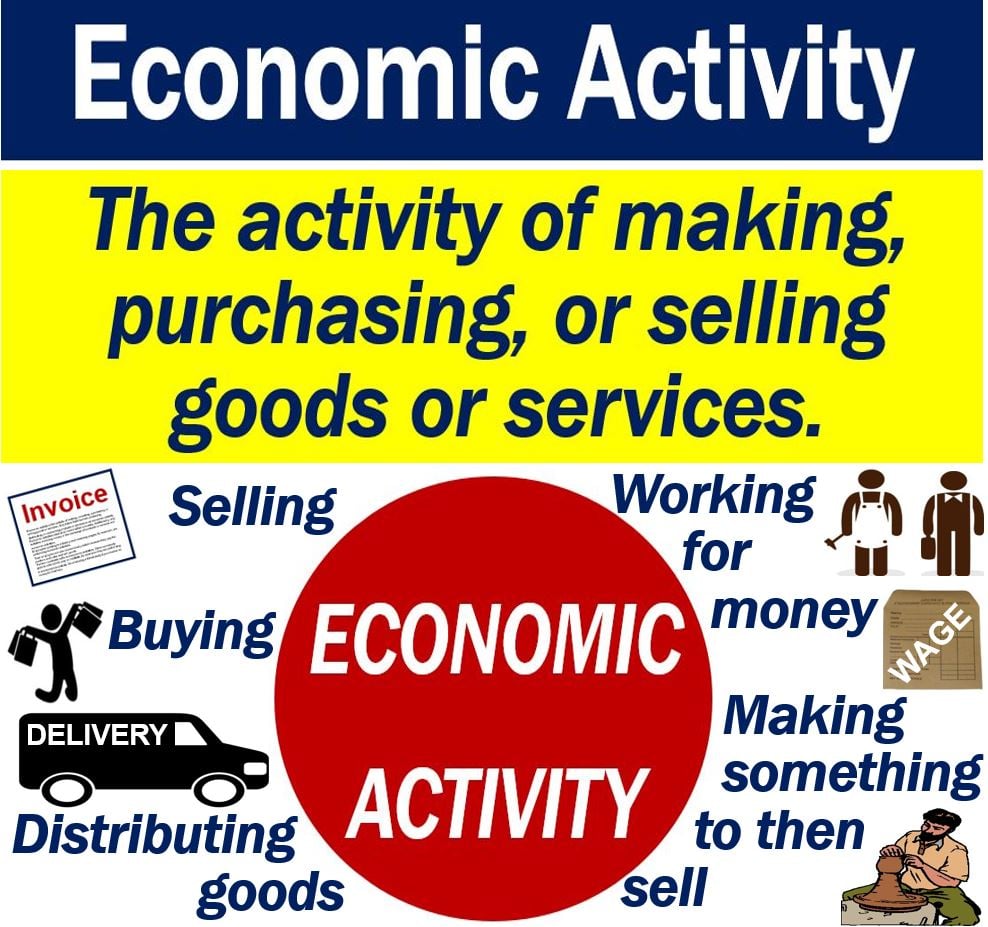Economic Activity is the activity of making, providing, purchasing, or selling goods or services. Any action that involves producing, distributing, or consuming products or services is an economic activity.
Economic activities exist at all levels within a society. Additionally, any activities involving money or the exchange of products or services are economic activities.
The advent of the digital economy has expanded the scope of economic activities, allowing for the creation and exchange of goods and services through virtual platforms.
Employees working in a factory and receiving wages, for example, are performing economic activities. Their employers are also economically active because they pay the workers and make and sell goods.
The term contrasts with non-economic activities. When somebody goes to a temple to pray or meditate, for example, they are performing a non-economic activity. So is helping a friend study if you receive no money for that help.

Economic activity – two definitions
Economic activity refers to all the actions involved in producing, buying, or selling goods and services.
The University of Toronto’s Department of Economics puts it this way: it’s the process where resources and capital create a flow of goods and services that help meet our endless needs, while also ensuring that these products are distributed among community members.
If that sounds a bit technical, the Cambridge Dictionary sums it up more simply as the act of producing, buying, or selling products or services.
There are many ways to define the term.
Economic activity – main aim
One of the main aims of economic activity is to produce goods and services to make them available to consumers.
All activities which we perform in exchange for money or things of value are economic activities.
Put simply; economic activities are those which we undertake to earn income, money, or wealth.
Unlimited wants vs. scarcity
With these activities, we secure the greatest satisfaction of unlimited wants with scarce and limited means.
‘Unlimited wants’ is an economic term. It refers to human’s insatiable appetite for things. Humans never get enough because there is always something else that we want or need.
However, even though we have unlimited wants, the resources we have available to get them is limited. In other words, the things we want are scarce.
Scarcity, which has plagued us ever since we first set foot on this Earth, has two halves:
- Limited resources.
- Unlimited wants.
GDP
GDP is the sum of every economic activity in a country. GDP stands for gross domestic product.
It is the most important economic measure of the state of a country’s economy. With one simple figure, we can tell whether an economy has grown, shrunk, or remained the same since one year ago.
In other words, GDP tells us whether economic activity has increased, declined, or remained flat.
Economic activity – classifications
Economists say there are four basic types of economic activities:
- Primary Sector – involves extracting and harvesting natural resources, such as agriculture, mining, and forestry.
- Secondary Sector – encompasses the processing of raw materials from the primary sector into goods, like manufacturing and construction.
- Tertiary Sector – provides services to consumers and businesses, such as retail, entertainment, and financial services.
- Quaternary Sector – focused on knowledge-based activities involving services like information technology, research, and education.
Modern economic activity increasingly incorporates sustainable practices, aiming to balance profitability with environmental responsibility and social equity.
